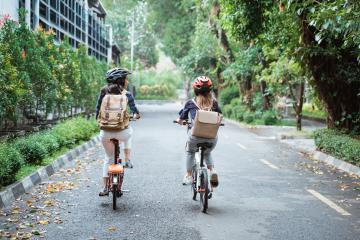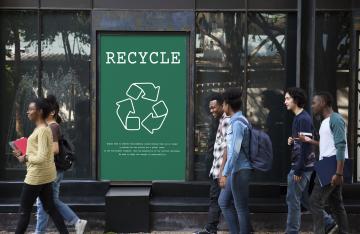
How do you get students to adopt environmentally friendly habits and greener lifestyles? With a little nudge!
A recently published book by the United Nations Environment Programme (UNEP) – with support from The Behavioural Insights Team and GRID-Arendal – aptly entitled The Little Book of Green Nudges, is a practical guide to help encourage students and staff on college campuses worldwide adopt more sustainable practices to reduce one’s environmental footprint and carbon emissions – from what they eat to what they consume.
“Universities are the source of so much knowledge that students will continue to utilize throughout their lives – instilling sustainable habits and values should be a key part of this education, with the potential to shift to cleaner, greener societal behaviours,” UNEP Executive Director Inger Andersen said at the launch of the Little Book of Green Nudges. “Changing behaviour is critical if we are to stay within our planetary boundaries.”
The book provides simple guidance on how to reduce a campus's environmental impact through behavioural changes, or nudges. There are 40 nudges highlighted in the book to help spark sustainable behavior – from eliminating trays in cafeterias to reduce food waste and using appealing descriptions for plant-based dishes, to making recycling bins eye-catching and easy to use and providing more spaces for parking bicycles and fewer for parking cars.
“A simple ‘nudge’ towards everyday greener decisions is a powerful spur to environmental action for students and other campus community members,” said UNEP Associate Programme Management Officer Mari Nishimura. “Techniques such as gentle persuasion, changing the framing of choices, or harnessing social influence can all lead towards sustainable conduct and an eco-friendly campus.”
 One inspiring example comes from Dalhousie University in Canada, which has encouraged sustainable transport by installing more bike racks, bike pumps, bus shelters and electric vehicle infrastructure around campus. At the University of St Andrews in the UK, the school has removed trays and reduced the size of plates to cut food waste in student dining areas.
One inspiring example comes from Dalhousie University in Canada, which has encouraged sustainable transport by installing more bike racks, bike pumps, bus shelters and electric vehicle infrastructure around campus. At the University of St Andrews in the UK, the school has removed trays and reduced the size of plates to cut food waste in student dining areas.
“When a university provides easy bicycle parking and repair stations, it nudges students to bike to campus. When a university makes plant-based food the default dish, it nudges students towards environment-friendly diets,” added Nishimura. These green nudges are positive and gentle persuasions to influence behaviours on campus and to instill environmental values that can last a lifetime.”
Nudges have been shown to be particularly successful when they are introduced at timely moments of change. With COVID-19 forcing a major rethink in higher education, redesigning processes and routines to make their campuses safer, this is a good time to make them more sustainable too by incorporating green nudges in their schools.
“Now is the perfect time for trying green nudges, as higher education institutions are redesigning systems and routines in the wake of the emergence of COVID-19,” Nishimura said. “Students and staff can be encouraged to consider new behaviours and higher education leaders can consider how to build back better.”
Green nudging across five regions through GO4SDGs
According to the guide, nudges are effective and cost- and time-efficient. They focus on new behaviour, not new equipment, and can succeed by shifting existing systems and processes rather than creating new ones. Nudges that save energy and resources help save the planet, but they also save money for universities and students. And, they can contribute to achieving the UN Sustainable Development Goals (SDGs).
Through the recently launched Global Opportunities for Sustainable Development Goals (GO4SDGs) initiative, UNEP and its partners, including the Alianza de Redes Iberoamericanas de Universidades por la Sustentabilidad y el Ambiente (ARIUSA) and the US Partnership for Education for Sustainable Development and Africa Green University Network (AGUN), will accelerate the transition to inclusive green economies and sustainable living including through bringing the Little Book of Green Nudges to life by working with universities and academic institutions to apply the solutions in the book across five regions.
“Many of the solutions are easy, simple and even fun to do,” said Adriana Zacarias Farah, Head and Global Coordinator of GO4SDGs. “By sharing these solutions, others can replicate and/or scale these inspiring approaches to going green.”
 The University of Copenhagen in Denmark, for example, created a nudge to reduce heating loss from open windows by hanging turnable cards on them, with a red side to remind people to close windows and a green side to show when windows have been closed. Students at Aalto University in Finland set up a food-sharing group at that distributes leftovers from campus meetings and parties – so far, the group has prevented more than 7,000 kilograms of food from going to waste. And, at Tongji University in China, students can sort garbage and recycling correctly with waste-sorting game machines.
The University of Copenhagen in Denmark, for example, created a nudge to reduce heating loss from open windows by hanging turnable cards on them, with a red side to remind people to close windows and a green side to show when windows have been closed. Students at Aalto University in Finland set up a food-sharing group at that distributes leftovers from campus meetings and parties – so far, the group has prevented more than 7,000 kilograms of food from going to waste. And, at Tongji University in China, students can sort garbage and recycling correctly with waste-sorting game machines.
“Nudging can be a powerful tool at universities,” Zacarias Farah added. “We can see that when we nudge people away from overconsumption and waste, and towards energy efficiency and lower-impact lifestyles, we are playing a part in fighting climate change as well as preserving the natural world in which we live and on which we rely. “We are very pleased to see that after the regional launching of the Little Book of Green Nudges in Latin America organized by Go4SDGs, we have now 80 universities committed to implement green nudges. Go4SDGs will support a peer to peer network to share knowledge and best practices among these universities, added Adriana
UNEP is collaborating with higher education institutions around the world to pilot nudging on campuses. Already 200 universities have joined the programme and many more are set to join in the months ahead.
The Little Book of Green Nudges is one of many resources being offered through the GO4SDGs menu of services, which offers a range of policy, advocacy and knowledge-based tools, services and capacity building opportunities for youth, small businesses and policymakers on how to embrace sustainable lifestyles and make smart choices.
